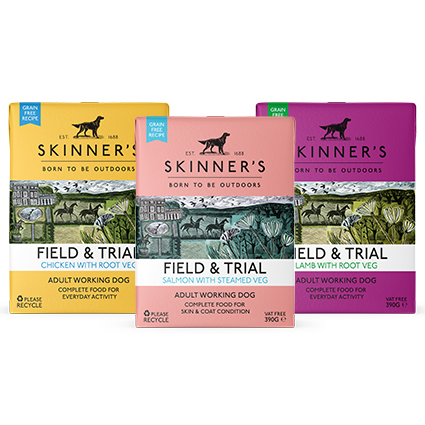

Leaders of the Pack: How one UK company is regenerating the pet care sector
By choosing to package pet food in cartons, rather than cans, brands are able to reduce their carbon footprint by up to 81%
Written by Tim Hansell, CEO, Skinner’s Group
The COP26 summit has placed further emphasis on the urgent need for businesses to increase focus on sustainability and consider how their actions impact the communities they operate in.
With over 12 million dogs in the UK, the pet food industry has gone from strength to strength in recent years to meet demand. In response to a rise in active consumers and an increase in dog ownership, Heritage dog food brand Skinner’s, launched it’s Get Out and Go! Range of Dog food with sustainability at its core. The new range includes 100% sustainable packaging, which is packed on site in the UK, reducing damaging transport miles.
Worth over £2.9 billion and growing 20% year on year, the pet food sector has an immense responsibility to scrutinize its environmental impact. A 2020 study found that Dry pet food production emits 106 million tonnes of carbon dioxide each year, more than some countries including Mozambique and the Philippines.
As one of the oldest manufacturers in the UK, Skinners has seen first-hand the impact the sector has on the planet. Our market and its supporting retailers must act quickly to turn the tide on the impact of single-use-plastics, as billions of pouches every year are sent to landfill, with standard pouches having one of the lowest recycling rates of all packaging. Around 50 times worse than the recycling rate of single coffee cups, which continually draw media attention for their environmentally damaging credentials.
Challenges
The challenge for the industry is to facilitate both the preference for sustainability and convenience. However, it is the convenience of non-sustainable packaging, like pouches, that has resulted in sales remaining high despite their sustainability pitfalls. However, investment in alternative technologies, like those that used by Skinners, that are helping turn the tide.
One of the challenges facing industry is striking a balance between eco-friendly packaging and retaining the nutritional benefits of the product. With all-natural ingredients sought by 41 per cent of dog food buyers and 66 per cent of the same group preferring to buy from a brand that uses eco-friendly packaging, it is pivotal that brands harmonize these two key purchase drivers.
A recent pet food report reinforced this, revealing that 60 per cent of dog food buyers prioritise health benefits in their product choices, echoing the need for manufacturers to focus on both quality and sustainability.
For leading brands in any market, they have a responsibility to use their influence to positively impact consumer decisions. At Skinners, we’ve elected to use our platform to educate customers on sustainability through appropriate investment, action and clear communication.
For example, many brands have moved from plastic trays to pouches or cans – marketing this as a sustainable move – however, they fall short on communicating that these manufacturing techniques result in additional carbon emissions being released into the atmosphere. In turn, creating misconceptions and restricting progress.
Solutions
In response to this, Skinner’s has taken the necessary measures to ensure that we are future proofing our manufacturing processes. This means keeping ahead of the curve on sustainability and educating our customers on how they can also decarbonise.
The introduction of Tetra Pak® across our Field & Trial range and Tetra Recart® packs across our Get Out and Go! range is a game changer for the brand and industry. Cartons are designed to be low-carbon, low-plastic and recyclable.
We opted for carton packaging because of the sustainability credentials of the materials. Throughout its standard product life and into end life, our cartons have minimal impact on the climate and are easily recyclable. They are made predominantly from paperboard, sourced from responsibly managed forests and other controlled sources which contributes to a low carbon circular economy. By being primarily plant based, carton packaging contains 71 per cent more renewable materials than a pouch and 68 per cent more than a can.
By choosing to package pet food in cartons, rather than cans, brands are able to reduce their carbon footprint by up to 81 per cent. Carton packaging is also allowing businesses to reduce their carbon footprint further thanks to its efficiency when transporting. In carton, the packaging’s rectangular shape and being so lightweight – means we can get 10–20 per cent more units per truck that we could if using cans.
For more information, please visit www.skinners.co.uk/
Instagram: @skinnersgetoutandgo
Twitter: @Skinnersdogfood
Facebook: @skinners.co.uk





